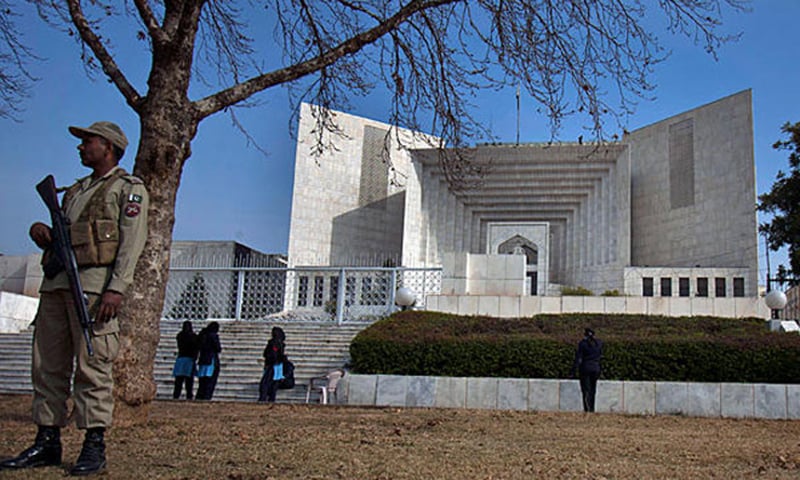Article 63-A. All parties to stand in defense of the constitution. CJ Supreme Court
The court issued notices to all provinces and political parties to submit their written replies
Whereas CJP Bandial stated that Article 63(A) is a “discipline of the emerging political system.”
ISLAMABAD (Web News)
Larger bench of Supreme Court of Pakistan conducted hearing on presidential reference seeking interpretation of Article 63-A.
During the hearing, Supreme Court asked the Attorney General whether provinces should also be made party in the reference. AGP said that provinces has nothing to do with the no-confidence motion as no move has been submitted against any chief minister in the country.
However, the court issued notices to all provinces and political parties and remarked that it wants all parties to stand in defense of the constitution. CJP while directing provinces to submit their written replies said that conducting hearing on presidential reference will be easier after these replies.
On the issue of planned protest and sit-in by JUI-F, Attorney General said that no sit-in can be staged during the voting process because as per law, campaign should end before 48 hours of the voting. He also pleaded the court to give directions for a peaceful protest.
Chief Justice asked all political parties to respect democratic values; however, Justice Mazhar Alam remarked that formation of tiger force armed with sticks by Pakistan Tehreek-e-Insaf (PTI) is regrettable.
Senator Raza Rabbani proceeded to the rostrum in the courtroom and informed the court that he has appealed to become a party in the case.
At this, CJP Bandial told Rabbani to go back to his seat as the court will hear his arguments later.
Justice Muneeb Akhtar remarked that the lawmakers are bound to follow the policy of the political party they are affiliated with. “Lawmakers have to vote in accordance with their party’s mandate. They have to follow the party policy. Full stop, that’s it,” Justice Akhtar said.
However, he noted that no MNA can be tagged as “good boy or bad boy”.
Meanwhile, Justice Mandokhel remarked that the Article 55 stipulates that all the parliamentary proceedings should be done through voting.
Whereas CJP Bandial stated that Article 63(A) is a “discipline of the emerging political system.”
“The article binds the lawmakers to stand by their party no matter even if they are unhappy with it.”
At this, Attorney General of Pakistan (AGP) Khalid Jawed Khan said the country s political system is based on Article 63(A) or Article 95 — whose violation could collapse the entire system.
Supreme Court Bar Association (SCBA) submitted its reply in Supreme Court SC and stated that members of National Assembly cast their votes on no-confidence motion in their individual capacity and as per Article 95 of the constitution vote is not right of any political party.
The association further said that members cannot be barred from voting under Article 63(A) as public runs government through their elected representatives.
SCBA added every vote that has been casted will have to be counted as per Article 95 and every lawmaker is independent in choosing which side to vote for.
It was further stated that Article 63 does not disqualify members for voting against party directions.
Jamiyat Ulema-e-Islam-Fazl (JUI-F) submitted its reply to the SC and stated that the Speaker of the house cannot be given the authority to reject the vote of members of the Parliament.
JUI-F also claimed that if the Members of National Assembly (MNA) are disqualified for life on the grounds of voting against their party, it will further weaken the already weak democracy of Pakistan.
The court should refrain from overlapping the supremacy of the Parliament, JUI-F stated in its reply.
PML-N said in its response submitted in the SC that Article 63A and Article 95 are clear and every lawmaker has the right to vote.
The party said that the vote of every MNA will be counted and that filing of the presidential reference is a premature and unnecessary move.
The reply further said that that the apex court “has the authority to interpret the Constitution but not to amend it.”

